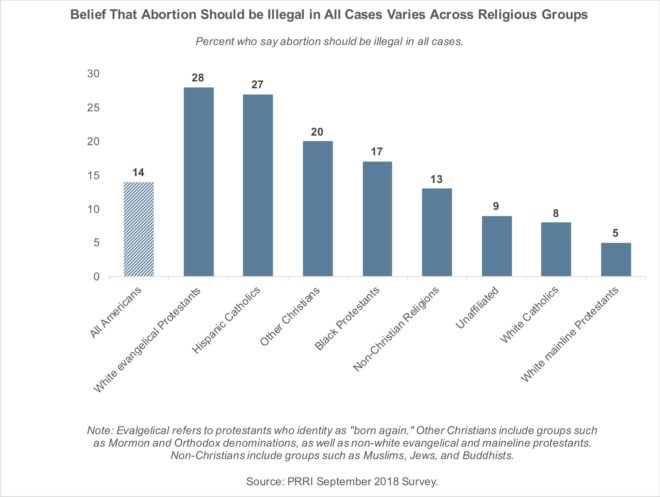Opposing Anti-Choice Legislation Isn’t a Violation of Religious Freedom, It’s an Expression of It
While some have argued that opposition to a woman’s right to make decisions about her body is a legitimate religious freedom issue, this is a fundamental misunderstanding of the religious freedom issue at stake in the abortion debate.
![[Photo: Male legislators vote by raising their hands.]](https://rewirenewsgroup.com/wp-content/uploads/2019/05/men-voting_2-800x533.jpg)
Since the beginning of January, nearly 400 abortion restrictions have been introduced in state houses across the country. While this is about the same number as last year, what’s new is that 40% of these bills are attempts to ban abortion. The goal is for one of these bills to make its way up to a Supreme Court, which is now theoretically conservative enough to overturn Roe v. Wade.
The extent to which this campaign is about criminalizing abortion became blisteringly clear when Sen. Clyde Chambliss responded to a question of how the bill would apply to unused fertilized eggs created through in vitro fertilization (IVF). Chambliss replied, “The egg in the lab doesn’t apply. It’s not in a woman.” This admission makes clear that the issue isn’t the moral status of prenates. The issue that traditionalist Christians, like Chambliss, are pursuing with these bills is women’s ability to control their bodies and their reproductive decision-making.
Questions about personhood and when life begins and ends are theological and philosophical questions. They are not medical questions. Historically, legal theory reflects the philosophical and religious beliefs of particular cultural contexts, and the current debate over abortion has brought to the fore a very public debate about the relationship between theology and the law in this country.
Religious people hold a variety of beliefs about when life begins and what constitutes personhood. Any attempt to pass legislation that imposes one religious group’s narrow theological position on the rest of the country is a breach of religious freedom.
Some, like Steven Waldman, argue that opposition to a woman’s right to make decisions about her body is a legitimate religious freedom issue and that to claim otherwise would “[mean] that public policy positions that are driven by religion are off the table while stances driven by secular reasons are legitimate.”
This is a fundamental misunderstanding of the religious freedom issue at stake in the abortion debate. No serious person is claiming that religious people shouldn’t be allowed to pursue public policy that reflects their religious beliefs. There are all sorts of public policies related to particular religious commitments about economic justice (living wage), homelessness (affordable housing), etc., that people of faith support and advocate for precisely because they are an expression of their belief about how they are called to live and work in the world.
What’s different in the case of abortion is that the policies (abortion bans in this case) that are being passed are based on a particular theological belief about when life begins that is not a medical fact. The threat of abortion legislation that privileges one religious belief about when life begins is that such legislation would violate the religious freedom of people who do not share that religious belief. Such legislation would mandate forced pregnancies for women who do not share the religious conviction that a fertilized egg has the same moral status as a newborn baby. The problem isn’t that anti-choice Christian traditionalists are religiously motivated, it’s that they seek to impose their narrow religious beliefs on the broader public who do not share those beliefs.
While outspoken evangelical and Roman Catholic leaders continue to promote the idea that Christianity is anti-abortion, this belief is both a misrepresentation of Christian history and a misrepresentation of what many committed Christians today believe. According to a 2018 PRRI poll, only 14 percent of people hold that abortion should be illegal in all cases. And mainline Protestants like Presbyterians, Methodists, Episcopalians, Lutherans, and UCC are the group most opposed to making abortion illegal in all cases with only 5 percent of that group supporting a total ban on abortion.

The same poll showed that 69 percent of people from traditions other than Christianity also hold strongly that abortion should be legal in the United States, while 79 percent of people who are not religiously affiliated support legal access to abortion in all or most cases.
The current attempt to ban abortion is based on the twin traditionalist Christian beliefs that pregnant women should have babies and that a fertilized egg is morally equivalent to a human baby. As Chambliss’ words made clear, however, this fight is about controlling the actions and self-determination of women.
In a 2009 piece for RD on a prior attempt to restrict reproductive rights, scholar Gordon Newby concluded that “religious Americans across the spectrum of faiths will be subjected to limitations that will contravene their faith’s most well-considered and cherished views about the major questions of life, reproduction, and freedom of religious conscience.” In other words, refusing to codify traditionalist, conservative religious beliefs into law isn’t a violation of anyone’s religious freedom. In fact, it not only protects a large majority of people in this country from the tyranny of patriarchy, it actually protects their religious freedom.


